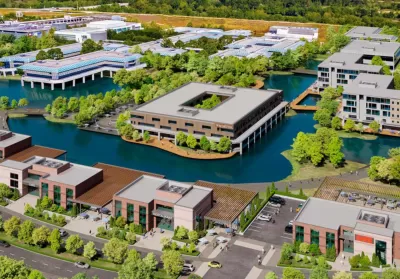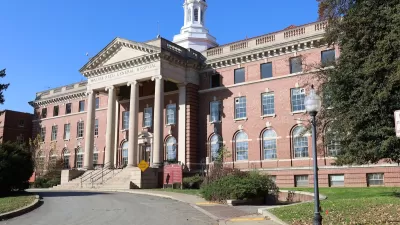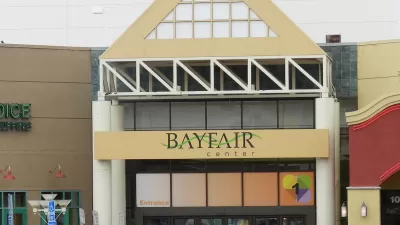The former ConocoPhillips campus, built as a self-sufficient complex complete with a lagoon and fitness center, will be repurposed into a mixed-use waterfront development.

A 63-acre former corporate campus in Houston will be redeveloped into a mixed-use project, reports Trevor Schillaci in the Architect’s Newspaper. “The effort will add new office space, residential, retail, and restaurants around the perimeter of the site.”
The original office park, built for Conoco (later ConocoPhillips) in 1984, “comprises 16 buildings arranged in five groups, with an additional service structure situated at the center of the complex.” Designed as a ‘technoburb,’ the complex aimed to provide everything workers needed: “While much of the complex is programmed as office (and garden) space, the central service building combines parking facilities, a gym, a computer center, staff cafeterias, a credit union, and a travel agency under one roof.”
“Recognizing that a post-pandemic workforce prefers low-rise, low-density workspaces, as opposed to the high-density office towers, the plan proposed by Midway reduces the original 1.3 million-square-foot site down to 650,000 square feet, while repurposing the remaining space to accommodate other uses,” Schillaci explains. Buildings will be remodeled into apartment units, a boutique hotel, as well as restaurants and bars with waterfront views. The developer plans to build on the complex’s sustainability elements by preserving on-site trees and green space and repurposing food and water waste. With demand for physical offices remaining low and the shift to remote work lasting longer than many predicted, adaptive reuse is gaining momentum as property owners look to new uses for now-obsolete office space.
FULL STORY: Midway announces redevelopment of Kevin Roche–designed ConocoPhillips office park in Houston

Trump Administration Could Effectively End Housing Voucher Program
Federal officials are eyeing major cuts to the Section 8 program that helps millions of low-income households pay rent.

Planetizen Federal Action Tracker
A weekly monitor of how Trump’s orders and actions are impacting planners and planning in America.

Ken Jennings Launches Transit Web Series
The Jeopardy champ wants you to ride public transit.

‘Minnesota Nice’ Isn’t so Nice When You Can’t Find a Place to Live
The Economic Development and Housing Challenge Program can help address the scourge of homelessness among Indigenous people.

NYC Open Streets Organizers Call for City Support
The number of open streets projects has dropped year after year as volunteer groups struggle to fund and staff them.

Crime Continues to Drop on Philly, San Francisco Transit Systems
SEPTA and BART both saw significant declines in violent crime in the first quarter of 2025.
Urban Design for Planners 1: Software Tools
This six-course series explores essential urban design concepts using open source software and equips planners with the tools they need to participate fully in the urban design process.
Planning for Universal Design
Learn the tools for implementing Universal Design in planning regulations.
Heyer Gruel & Associates PA
Ada County Highway District
Institute for Housing and Urban Development Studies (IHS)
City of Grandview
Harvard GSD Executive Education
Toledo-Lucas County Plan Commissions
Salt Lake City
NYU Wagner Graduate School of Public Service





























